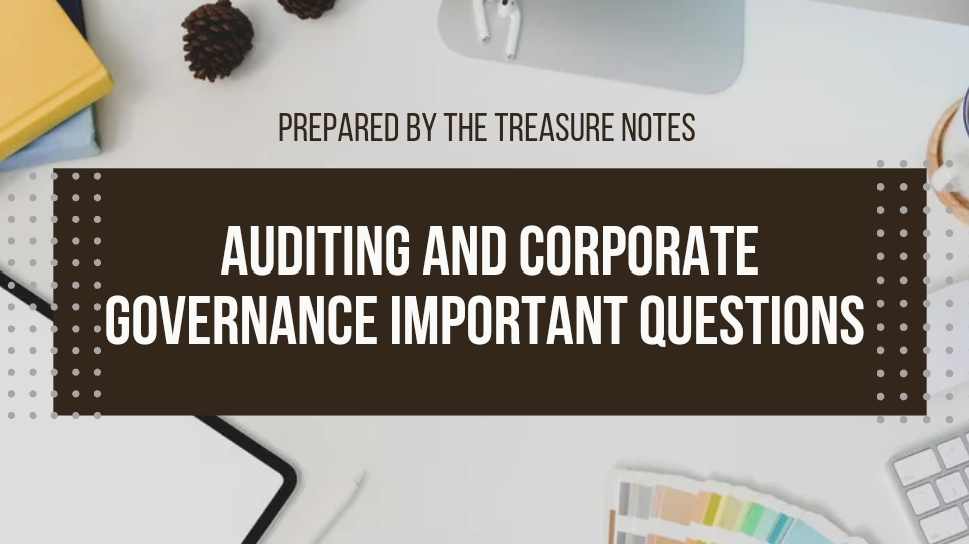In this post we have Provided Gauhati University BCom 6th Sem Auditing and Corporate Governance Important Questions for Upcoming Examination.
Our expert team has carefully analyzed the question paper patterns and syllabus to prepare important questions for GU Auditing and Corporate Governance. You can use these questions as a reference for your preparation and should make sure to review them thoroughly.
| BUY AUDITING SOLVED PAPERS | |
| 2022 SOL. PDF | 2023 SOL. PDF |
Gauhati University B.Com 6th Semester Auditing and Corporate Governance Important Questions
To read important questions, you can scroll down and read the chapter wise important questions given below:
Unit: 1 Introduction to Auditing
Q. Explain the meaning of Auditing. What are its objectives? Explain.
Q. State the basic principles/techniques governing an Audit.
Q. Define Continuous Audit. What are the advantages and disadvantages of Continuous Audit?
Q. What do you mean by Interim Audit ? Describe the advantages and disadvantages of Interim Audit.
Q. Explain final Audit, Describe its advantages and disadvantages.
Q. What do you mean by management Audit ? Explain the objectives and advantages of management audit.
Q. What is Statutory Audit ? Discuss the main features and advantages of Statutory Audit.
Q. What do you mean by continuous audit?
Q.How does continuous audit differ from periodical audit? What are its advantages and disadvantages?
Q. “Auditing begins where accountancy end.” Explain this statement and also distinguish between auditing and accountancy.
Q. Distinguish between Auditing and Accountancy.
Q. Explain the advantages and limitations of Audit.
Q.Define Audit Planning. Discuss the factors affecting the Audit Plan.
Q. Define the term Audit Planning. What are the main benefits of Audit Planning?
Q. Explain the factors influencing Audit Planning. Discuss the steps involved in Audit Planning.
Q. Define internal control, internal audit and internal check with their objectives and also distinguish between them.
Q. Define the terms vouching. Explain the main features/characteristics of vouching.
Q. What do you mean by vouching? What are the main objectives of vouching?
Q. “Vouching is the backbone of Auditing.” Explain various principles that should be taken in consideration while adopting the techniques of vouching
Q. What is Audit evidence? Explain the procedure to obtain audit evidence.
Q. Mention some important objectives of vouching and routine checking. Discuss the main points which must be taken care of while vouching the transactions
Q. What do you mean by verification and valuation of assets? Distinguish between vouching, verification and valuation
Q.What are the objectives of verification and valuation of assets? Discuss the auditor’s duty in regard to valuation and verification of assets.
Q. Write short notes on:
- Various types of Fraud and Errors
- Periodical Audit
- Audit working papers
- Essential elements of an effective internal control system
- Auditing in detail.
- Audit Evidence
- Audit sampling
- Government Audit
- Scope of Auditing
- Internal check vs Internal audit vs Internal control
- Vouching
- Principles of Auditing.
Unit: 2 Audit of Company
Q. Who can be appointed and who cannot be appointed as an auditor of a company? (Qualification and Disqualification of an auditor)
Q. How an auditor is appointed ? Explain the procedure for removal of an auditor before and after the expiry of the term?
Q. Explain the procedure of issue of shares at a premium and at discount under the provisions of the companies Act, 2013. Point out the auditor’s duties in this connection.
Q. Explain the procedure of transfer and transmission of shares. What are the auditor’s duties in this regard?
Q. What are the rights, liabilities and duties of an auditor under the Companies Act, 2013? Explain them briefly.
Q. What are the special considerations involved in the audit of a company?
Q. Discuss the duties of an auditor as regards audit of the share capital of a company.
Q. What do you mean by a qualified report? Under what circumstances as an auditor of a company would you qualify the report? Draft a qualified report giving at least four reasons.
Q, Describe the general considerations which an auditor has to keep in mind while drafting his report.
Q. What is a statutory report? Mention the contents of the Statutory Report. Explain the auditor’s duties in this regard.
Q. Discuss the elements and features of a good Audit Report.
Q. What are various types of audit reports? Explain them briefly.
Q. Explain the importance of Audit Report.
Q. Distinguish between Audit Report and Audit Certificate.
Q. Explain Civil Liability of an auditor under Companies Act 2013.
Q. Explain Civil Liability of an author for negligence and misfeasance.
Q. Discuss the Liability of an auditor on the ground of negligence.
Q. Discuss the Liability of an auditor for misstatement in prospectus.
Q. Write a note on Criminal Liability of an auditor under Companies Act 2013. Can there be any relief to auditor from his liability?
Q. To what extent, an auditor is Liable to third parties? Explain with case law.
Q. Distinguish between Contractual and Statutory Liabilities of an auditor.
Q. Distinguish between Civil and Criminal Liabilities of an auditor. Explain by referring to legal cases.
Q. Write a note on:
(a) Liability of an auditor for professional misconduct.
(b) Liability of an auditor under other statutes than Companies Act 2013.
Unit: 3 Special Areas of Audit
Q. What is a Cost Audit? What is the principle behind it? How does it differ from Statutory Audit?
Q. State the provisions of the Companies Act, 1956, regarding Cost Audit in the case of limited companies. Do these provisions of the Act apply to all concerned companies engaged in manufacture or similar activities? What is the justification for a Cost Audit? Give reasons.
Q. What are the qualifications of a Cost Auditor? How is he appointed and how can he be removed?
Q. What is the role of Cost Audit in manufacturing and trading business? What should be included in a Cost Audit Report?
Q. How will you as a cost auditor verify the following: (i) Materials (ii) Labour (iii) Overhead charges (iv) Stores and spare parts?
Q. Describe the cost audit procedure of a manufacturing unit.
Q. What points should be incorporated in the cost audit report? Give a specimen of such a report.
Q. In which direction are cost records of value to the auditors of the financial accounts? To what extent do you consider an independent audit of the cost accounts to be necessary?
Q. “Cost Audit of industries should follow a uniform pattern.” Do you agree?
Q. What are the different objectives of the cost audit?
Q. “Cost Audit is a luxury.” Comment.
Q. Point out various arguments against cost audit.
Q. Discuss the advantages of cost audit to the government.
Q. Write a short note on “True and Fair” cost of production.
Q. Explain the provisions of Sec. 44 AB of Income Tax Act with reference to scope of audit and form of audit report.
Q. What is selective tax audit under section 142 (2A) of Income Tax Act?
Q. Discuss the provisions relating to appointment of tax auditor.
Q. Explain various guidelines issued by the Institute of Chartered Accountants of India regarding audit of Public Trusts.
Q. What are the provisions relating to certification of auditors for claiming deductions under Income Tax Act?
Q. Explain various clauses of Form No. 3CB with regard to audit under Section 44 AB.
Q. Explain provisions relating to compulsory tax audit.
Q. How should an auditor proceed to conduct a tax audit?
Q. Explain various exemptions under Income Tax Act for which auditor’s certification is required.
Q. Explain the role of auditor in tax planning under Income Tax Act.
Unit: 4 corporate governance
Q. Define Corporate Governance. What are the main characteristics of Corporate Governance?
Q. What do you mean by Corporate Governance? Discuss the need and importance of Corporate Governance.
Q. Explain the term Corporate Governance? What are the main principles of Corporate Governance.
Q. Describe the elements conceptual framework of Corporate Governance.
Q. Explain corporate management vs. governance.
Q. Explain the reforms in Companies Act, 2013 in relation to corporate governance.
Q. Define Independent Director. What are the qualifications and codes for Independent Directors,
Q. Explain SEBI guidelines in relation to corporate governance.
Q. Define Agency Theory.
Q. Explain Stewardship Theory.
Q. What is stakeholder Theory?
Q. Define Resource Dependency Theory.
Q. Write note on Anglo-American Model.
Q. Explain German Model.
Q. What is Japanese Model?
Q. Briefly Explain different types of theories of corporate governance.
Q. Explain the different types of models of corporate governance.
Q. Define Agency Theory. Discuss the features and importance of Agency Theory.
Q. Write Notes on:
(a) Stewardship Theory
(b) Stakeholder Theory
Q. Define Audit Committee. Discuss the functions and role of Audit Committee.
Q. Explain composition and powers of Audit Committee.
Q. What do you mean by Nomination and Remuneration Committee? Describe its composition and functions.
Q. What is the Stakeholders Relationship Committee? Discuss its composition and functions.
Q. Define CSR Committee. What is the composition and functions of CSR Committee?
Q. Define CII. Discuss the major recommendations by CII.
Q. Define Cadbury committee. Discuss its recommendations.
Q. Explain the recommendations of J.J. Irani Committee.
Q. Define corporate Scandals. What are the different types of corporate frauds? How to prevent corporate Scandals?
Q. What are the symptoms of Corporate failure ?
Q. What are the common governance problems noticed in various corporate failures. 2023
Q. What are the pillars of courts and standards on corporate governance ?
Q. What are the significance or importance of course and standard of corporate governance ? 2023
Unit: 5 Business Ethics
Q. Define the term Business Ethics. What are the main features of business Ethics.
Q. What do you mean by Business Ethics? Explain the need and importance of Business Ethics.
Q. Describe the objectives and sources of Business Ethics.
Q. Discuss the main factors effecting Business Ethics.
Q. Briefly explain the general principles of business ethics.
Q. Discuss the specific principles of business ethics.
Q. Define Woodrow Wilson’s principles of business ethics.
Q. Define Morality. What are the main characteristics of Morality?
Q. What do you mean by morality? Discuss the role of morality in business.
Q. Discuss the relationship between morality and ethics. What is the difference between morality and ethics?
Q. Morality vs. Ethics 2022
-00000-
Also Read: GU Auditing and Corporate Governance Qn. Paper 2023
Last Words on Auditing and Corporate Governance Important Questions
We hope that the important questions given above will prove to be very helpful in your exam and you score good marks in your examination. Best of luck 🤞🍀.

